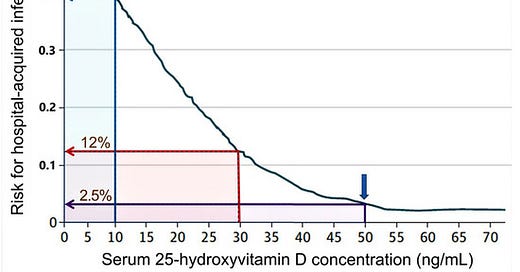During the COVID pandemic I have published many articles on the benefits of vitamin D for fighting the virus and being an alternative to unsafe and ineffective vaccines. Now comes a new research finding showing another benefit.
Vitamin D levels in post-mortem brain tissue were linked with cognitive function, an autopsy study showed. Higher concentrations of 25(OH)D3 -- the main form of vitamin D assessed in the study -- in four areas of the brain were tied to 25% to 33% lower odds of dementia or mild cognitive impairment, according to Sarah Booth, PhD, of Tufts University in Boston, and colleagues as reported in Alzheimer's & Dementia.
The study aimed to analyze brain concentrations of vitamin D and determine whether associations with cognitive measures and neuropathology outcomes existed.
"Many studies have implicated dietary or nutritional factors in cognitive performance or function in older adults, including many studies of vitamin D, but all of them are based on either dietary intakes or blood measures of vitamin D," said coauthor M. Kyla Shea, PhD, also of Tufts, in a statement. "We wanted to know if vitamin D is even present in the brain, and if it is, how those concentrations are linked to cognitive decline."
The researchers evaluated 25(OH)D3 and other vitamin D forms in four brain regions -- mid-frontal and mid-temporal cortex, cerebellum, and anterior watershed -- in post-mortem tissue of 290 deceased participants in the Rush Memory and Aging Project. Decedents whose brains were stored for more than 6 years were excluded.
Global Alzheimer's pathology included counts of neuritic plaques, diffuse plaques, and neurofibrillary tangles. Macroscopic and microscopic cerebral infarctions were identified as were Lewy bodies.
Vitamin D levels in post-mortem brain tissue were linked with cognitive function, an autopsy study showed.
Higher concentrations of 25(OH)D3 -- the main form of vitamin D assessed in the study -- in four areas of the brain were tied to 25% to 33% lower odds of dementia or mild cognitive impairment, according to Sarah Booth, PhD, of Tufts University in Boston, and colleagues.
However, brain concentrations of vitamin D were not associated with any neuropathology or biomarker outcome, Booth and co-authors reported in Alzheimer's & Dementia.
The study aimed to analyze brain concentrations of vitamin D and determine whether associations with cognitive measures and neuropathology outcomes existed.
"Many studies have implicated dietary or nutritional factors in cognitive performance or function in older adults, including many studies of vitamin D, but all of them are based on either dietary intakes or blood measures of vitamin D," said coauthor M. Kyla Shea, PhD, also of Tufts, in a statement. "We wanted to know if vitamin D is even present in the brain, and if it is, how those concentrations are linked to cognitive decline."
The researchers evaluated 25(OH)D3 and other vitamin D forms in four brain regions -- mid-frontal and mid-temporal cortex, cerebellum, and anterior watershed -- in post-mortem tissue of 290 deceased participants in the Rush Memory and Aging Project. Decedents whose brains were stored for more than 6 years were excluded.
Global Alzheimer's pathology included counts of neuritic plaques, diffuse plaques, and neurofibrillary tangles. Macroscopic and microscopic cerebral infarctions were identified as were Lewy bodies.
Participants had a mean age of 92 at death. Most were female (77%) and had at least 12 years of education (72%).
Cognitive evaluations were performed annually. At their last clinic visit, 40% of participants had diagnosed dementia, 24% had mild cognitive impairment, and 36% had no cognitive impairment.
Odds of having dementia or mild cognitive impairment at the last visit were 25%-33% lower per doubling of 25(OH)D3 in the four brain regions (OR 0.669-0.754, P≤0.031 for all).
"We now know that vitamin D is present in reasonable amounts in human brains, and it seems to be correlated with less decline in cognitive function," Shea said.




